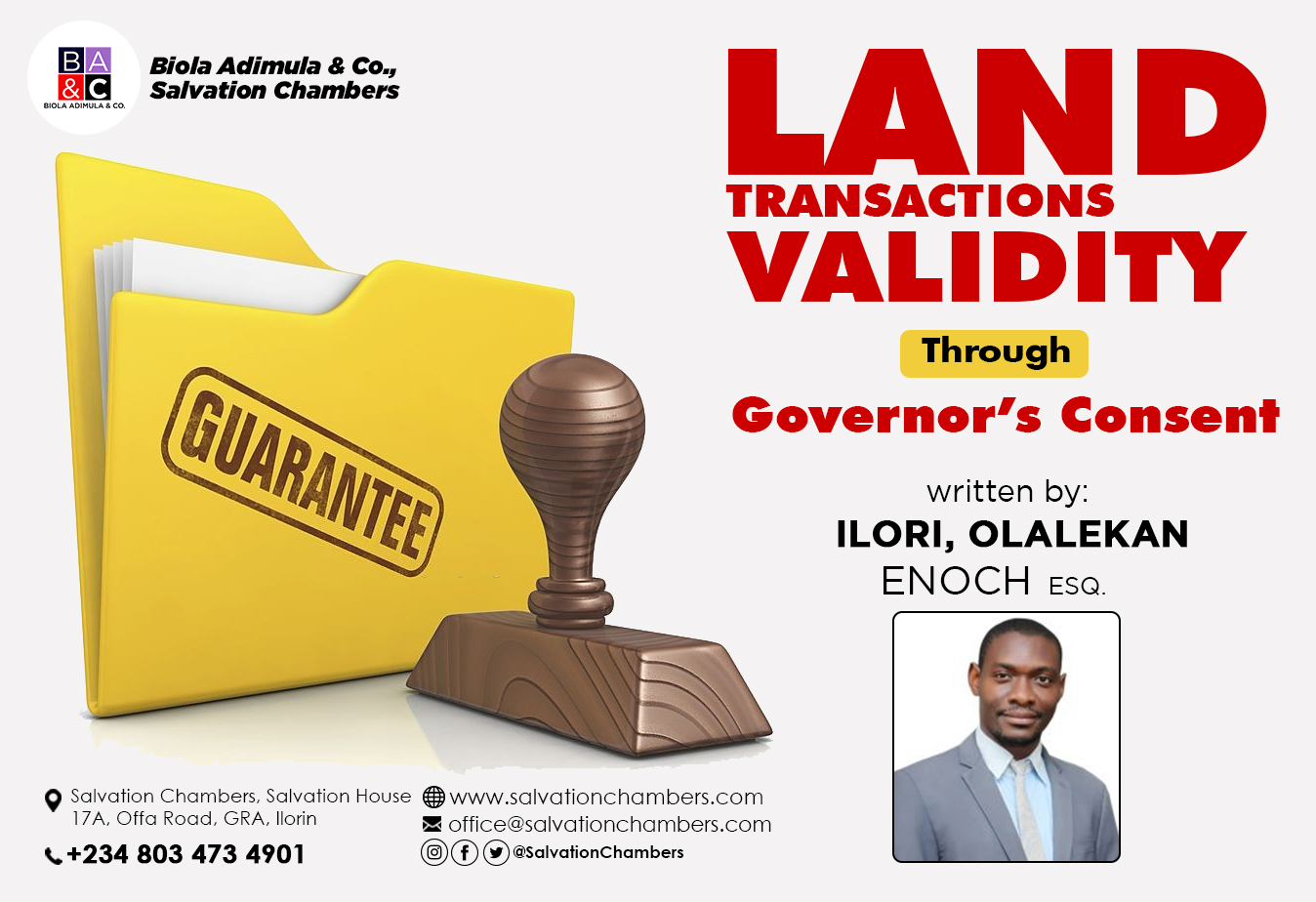With the advent of the Land Use Act, 1978, land transaction in Nigeria has taken a new dimension. Apart from the fact that there is paradigm shift in the land tenure system in Nigeria, the Act brought the leasehold system wherein the authority and administration of land in a state is vested with the Governor, who in turn hold such land in trust and administer it for the use and common benefit of all Nigerians.
The Act becomes the major instrument or law for the general administration of land in Nigeria. For instance, the Act provide as follows:
any transaction or any instrument which purports to confer on or vest in any person any interest or right over land other than in accordance with the provisions of the Land Use Act shall be null and void.[1]
Any transaction regardless of how it is properly done if it is not in tandem with the provisions of the Act shall be null and void.
Statutory Right of Occupancy
Statutory Right of Occupancy can be described as the rights and interest bestow, given, or granted to an individual for the use and occupation of land in a particular area within the state. The land in urban area is under the control and management of the Governor of a state, while the other lands are under the control and management of Local Government within the area of jurisdiction of which the land is situated[2]. But the control and management of land by Local Government is still made subject to the Act.
Furthermore, Section 5 (1) (a) of the Act places overriding power on the Governor over the Local Government. The Act provides thus:
It shall be lawful for the Governor in respect of land whether or not in an urban area
- To grant statutory rights of occupancy to any person for all purposes[3]
By the above provision, the Governor of a state is empower to grant statutory rights of occupancy in respect of land whether or not in an urban areas of the state. Therefore, any person may apply for grant of Statutory right of occupancy with respect to land in urban area as well as in rural area for all purposes e.g. residential, commercial, agriculture, industrial etc. where he takes such action, it is right and lawful. Needless to say that statutory rights of occupancy granted by the Governor over land in any area of the state is superior to all other existing rights which include customary right of occupancy and it extinguishes all such rights. As it’s expressly stated in the Act thus:
Upon the grant of a statutory right of occupying under the provisions of subsection (1) of this section all existing rights to the use and occupation of the land which is the subject of the statutory right of occupancy shall be extinguished[4]
Every statutory right of occupancy is usually with a term granted and there is opportunity for re-grant of it after the expiration of the term granted.
Necessity of Governor’s Consent
When an individual has been given the statutory rights of occupancy, he has an obligation to pay rent on it as shall be decided by the Governor.
But when a holder of statutory rights of occupancy decided to alienate his right to another person, he has obligation and condition to be fulfilled for such transfer or sale to be valid in law.
The condition is simply stated in section 22 of the Act as follows:
It shall not be lawful for the holder of a statutory right of occupancy granted by the Governor to alienate his right of occupancy or any part thereof by assignment, mortgage, and transfer of possession, sublease or otherwise howsoever without the consent of the Governor first had and obtained.
From the above provision, the consent of the Governor is mandatory. Such consent must first be had and obtained otherwise the assignment or mortgage becomes illegal and invalid. The provision itemize transactions with respect to statutory right of occupancy which require Governor’s consent they include:-
- Assignment:- the process of transferring land from the seller usually referred to as the Assignor to the buyer called the Assignee with consideration furnished by the latter. The Assignor assigns, transfer, alienate the whole or part of his\her unexpired residual interest in the land subject of statutory right of occupancy to the Assignor.
- Mortgage:- is the process by which a party called mortgagor convey or assign his property to another party usually a creditor or the lender (e.g. bank) called Mortgagee, as security on a loan to be repaid back.[5] It is also refer to as debt instrument to secure through real estate property (called collateral) the repayment of loan obtained by the debtor.[6]
- Transfer of Possession:- It is the process where you transfer ownership of land or property. It is a possession whose ownership changes or lapses (transferred possession).[7]
- Sublease:- As earlier pointed out, the land tenure system in Nigeria is leasehold with the abolition of freehold. This means that all who are granted land from the Governor are “lessee” while the lessor is the Governor. When you sell, transfer or alienate, Governor’s consent is compulsory and mandatory.
The Supreme Court also in the case of Bulet Int’l (Nig.) Ltd v. Olaniyi established the necessity of Governor’s consent to alienation of interest of the holder of Statutory right of occupancy when it said:
No alienation of the interest of the holder of a statutory right of occupancy in respect of a piece or parcel of land, is valid unless the consent of the Governor (or in the case of the FCT, the Honorable Minister) has been sought and obtained.[8]
Who is the Party to Apply for Governor’s Consent?
The primary responsibility to apply for Governor’s consent is placed on the Assignor, that is, the holder of Statutory Right of Occupancy. Buttressing this is the dictum of Kekere-Ekun, J.S.C when he opined thus:
It is the holder of a statutory right of occupancy that has the duty to apply for the Governor’s (or minister’s) consent in respect of the land he wishes to transfer, assign, mortgage, etc.[9]
The above is the position of the law. However where the assignor unreasonably withhold his consent, the assignee may apply but must disclose in his application the reason why he and not the assignor is making the application.[10] However, either of the party can bear the financial expenses for obtaining the Governor’s consent depending on the agreement between the parties.
In all, where there is a transaction on a property that has statutory right or Certificate of Occupancy, it is imperative and essential to seek Governor’s consent, failure which render such transaction inchoate and makes it invalid. The procedure for applying and obtaining Governor’s consent varies from State to State depending on the requirement and procedure as laid down by land registry of each state.
By Ilori Olalekan Enoch
[1] Section 26 of the Act
[2] Section 2(1)(b) of the Act
[3] Section 5 (1)(a) of the Act
[4] Section 5(2) of the Act
[5] Meaning of Mortgage in Longman Dictionary of Contemporary access at www.idoceonline.com on 25/7/2020
[6] Home ownership-Mortgage access at www.investopedia.com on 24/07/2020
[7] Transferred Possession access at www.vocabulary.com on 24/07/2020
[8] (2017) 17 NWLR (1594) P. 260 @ P. 286, Paras. E-F
[9] Bulet Int’l (Nig.) Ltd v. Olaniyi (supra) @ p. 286 paras F-G; Also in Mbanefo v. Agbu (2014) 6 NWLR (Part 1403) 238; Ownoboys Technical Services Ltd v. Union Bank of Nig. Ltd (2003) 15 NWLR (Part 844) 545.
[10] Adetunyi V. Agbojo (1997) 1 NWLR (pt. 484) 705 at 718

